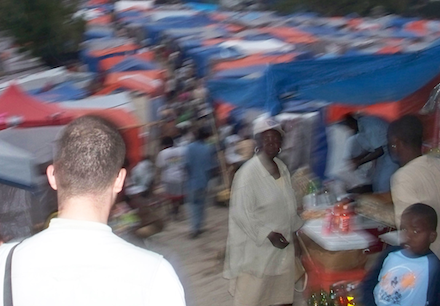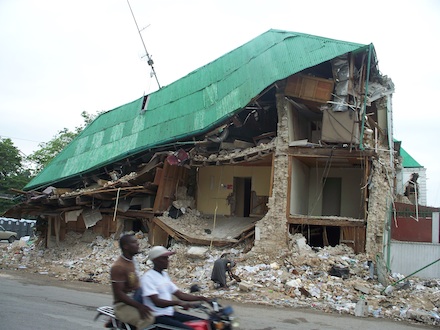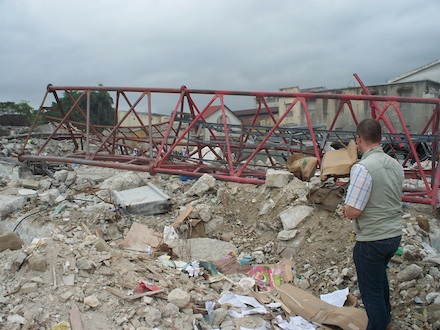
Our Regional program manager in Haiti, Eric Cesal, is doing his third 'tour of duty' with Architecture for Humanity. Having worked across the Gulf Coast after Hurricane Katrina he understands the role we have to respond to immediate needs while focusing the long term rebuilding. Eric is our 'Phd McGuyver' - smart as a tack with a strong moral sense of urgency about him. He is a few weeks in and a few years from leaving. I thought I'd share his first letter with you to get a sense of life on the ground.
"Day to day in Port Au Prince is the knowledge that everything wants to be done today. Every piece of rubble could be picked up, and every tarp could be righted. It is also the knowledge that nothing (or at least very little) is going to happen today. You will look for small victories and some days you don't even find that.
Port Au Prince is a slog. It is a slow grinding fight for inches. Getting from point A to point B consumes a good part of your day - traffic creeps along as if nothing is happening. And yet everything is happening: markets spontaneously form in the road, broken down vehicles slump like quitters and their drivers shrug indifferently. Sometimes the traffic just seems to concern nothing at all.
Many of the roads looked like they have been bombed, which in a sense, I guess they have. They have been wracked by years of neglect and disinterest until the earthquake finally along and put an exclamation point on the whole thing. Haitians are incredibly resourceful and they have adapted to the situation by buying sturdier and sturdier cars. Pretty much everyone has an SUV - they are the only way to navigate the roads. An incredible percentage of these SUVs are Toyota SUVs. Why? Because at some point Haitian mechanics decided that that was what they were going to import parts for. It is a viral orchestrated monopoly. No one dares buy a Ford, because if it were to break down, you'd have no one to fix it and no parts to fix it with.
Walking is worse. The Caribbean sun bears down like an accusation, and PAP's steep hills try one's knees. The walks aren't leisurely - they're business, and I usually find myself carrying a laptop, a briefcase, survey equipment, water, etc. Each walk therefore turns into a hike, merely by the grade and the weight. I was raised an East Coast urbanite, and I compulsively walk like I'm trying to politely escape a fire. I constantly have to remind myself to slow down to avoid overheating. I sweat and curse but don't dawdle. Too linger long is to attract attention, and with kidnappings on the rise I'm not eager to stand around and appear exhausted. I try to walk with purpose, and run myself ragged.

Many streets overflow with garbage and the smell slaps you around. The sickly sweet roars to life around 10AM and is a like a fog by noon. By my second week I was becoming aware of the fact that I was getting used to it. It felt normal. Not just the smell, but the visuals too. Goats, dogs and chickens meander around the piles, some of which have been set on fire by residents who can no longer stand to look at them. Flies buzz. Cars swerve. There is so much rubble. Sometimes the cacophony rattles your head like a hangover. Other times I feel like I can't hear anything at all. If I didn't know better, I'd swear I had tinnitus.
Most nights I lie awake and stare up at the concrete ceiling above my head and try and calculate how long it would take me to get out of my bedroom, out on the balcony and then down to the backyard. I figure the original quake lasted twenty seconds, so there might actually be 5 to 10 seconds of shaking before the ceiling would actually start moving downward. Maybe 1 to 2 seconds for it to make the trip. Plenty of time to get out the door. In an earthquake, though, the door frame would rack, and it would be impossible to open the leaf if the frame is only a few degrees out of kilter, so I usually sleep with the door to the balcony open. It invites a lot of mosquitoes, which I deal with by covering myself head to toe in Repel that's 40% Deet, every night, before I go to bed. It's a strange ritual that I haven't entirely gotten used to. It seems like there should be something sensual about it, but by the time I'm done I feel so greasy and stinky I pretty much turn myself off. I'm reasonably safe from earthquakes, and malaria carrying mosquitoes, and that's usually enough to fall asleep, eventually.
Most mornings I wake up to roosters crowing. They're crowing at the dawn, or at the dogs, and the dogs are barking back because they'd like to eat the chickens. I contemplate eating the chickens, too. They belong to my good friend, so I refrain, but the argument gets more compelling every day. A) I would get more sleep and B) I really like chicken. Perhaps someday there will come an opportunity to snatch a chicken and I can just blame it on the dog. My friend doesn't like his dogs, anyways.

I wouldn't be in Haiti if I weren't just a little bit optimistic. I think my optimism flows from the character of my coworkers; for all the horrors around us, we remain positive. There is, I think, a sense that we are doing something important. Victories here are small but they can be very easy. Giving someone a dollar can feed their family for a day. Here, even the promise of a helping hand can raise spirits. I think people are cautiously optimistic, but if you could dig beneath that I think you would find the hope and possibility that this recovery might remedy the problems that lay at Haiti's foundations. All the ruin brought on by years of poor politics and international policy might be finally passed over, and that a new chapter might be turning.
The people you meet in the streets have a similar sturdiness. They are aware that the attention of the world is on Haiti like it has never been, and I think they are genuinely touched by the presence of so many foreigners. However, many promises have been made. As aid workers begin to drift back to their home countries and promises are left behind unmet, I think the mood will sour towards the international community. Many of the schools, orphanages and such things have been run or supported by foreign charities for years. I think therefore the gratitude is real, and that an average Haitian will trust a foreign NGO much more easily than they'll trust their own government. But that trust is walking a line every day.
Tomorrow we'll walk it again."
Eric Cesal
Regional Program Manager - Haiti
---
Please note Architecture for Humanity is not a 'first responder' organization, we are the last responders. Our professional construction teams, 50% of which are Haitian, are committed in country for the next 2 to 3 years. If funding lasts, they could be there for years after.We are implementing an 11 point plan first laid out on the Huffington Post in January 2010. This includes the building of schools, community facilities and developing transitional and long term sustainable housing.
We wish the best to our team, Yves, Schendy and Eric, as they work alongside community groups, NGOs and social entrepreneurs and to help rebuild Haiti from the ground up.